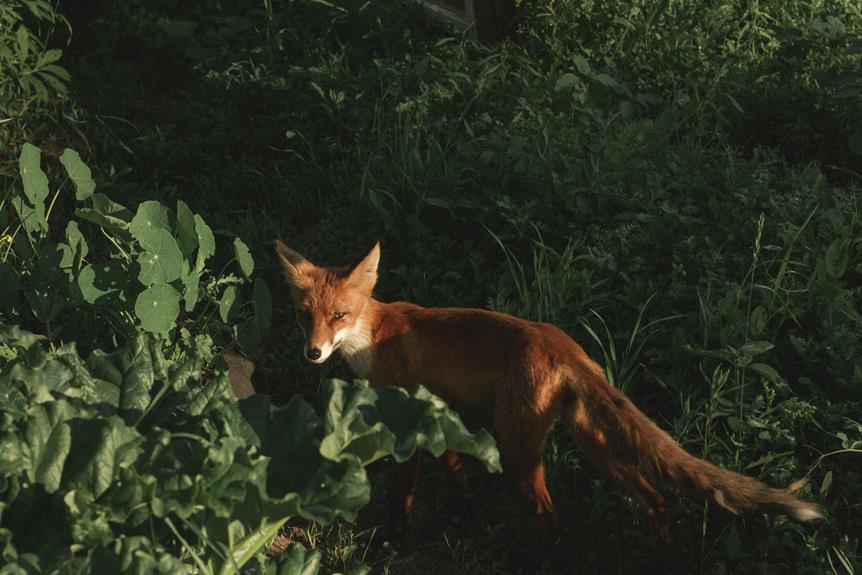Embark on a captivating journey through the wonders of botany and zoology, where the secrets of the plant and animal kingdoms await.
In this informative article, we will explore the fascinating world of these distinct biological sciences and their profound impact on agriculture, medicine, and conservation.
Discover the intricate anatomy, physiology, and ecological roles of plants and animals, and delve into their evolutionary history.
Join us as we unravel the significance of botany and zoology in shaping our understanding of the natural world.
Key Takeaways
- Studying botany and zoology helps us understand the relationships between organisms and their environments.
- Botany and zoology contribute to the conservation and protection of the natural environment.
- These fields highlight the significance of biodiversity and the interconnectedness of different species.
- Botany and zoology have applications in various fields such as agriculture, medicine, and ecology.
The Importance of Studying Botany and Zoology
The acquisition of knowledge in botany and zoology is crucial for understanding the intricate relationships between organisms and their environments, highlighting the importance of studying these disciplines.
Exploring biodiversity is a key aspect of both botany and zoology. Botany focuses on the study of plants, their structures, functions, and interactions with the environment. Understanding the diversity of plant species helps us appreciate the vital role they play in maintaining ecological balance.
Zoology, on the other hand, delves into the study of animals, their behaviors, adaptations, and ecological systems. By studying zoology, we gain insights into the complex interactions between different animal species and their habitats.
Both botany and zoology contribute to our understanding of ecological systems, providing us with the knowledge needed to conserve and protect our natural environment.
Exploring the World of Plants and Animals
Exploring the world of plants and animals offers a unique opportunity to observe and understand the intricate interconnectedness of different species and their environments. The wonders of the plant and animal kingdom never cease to amaze.
Botany, the study of plants, helps us appreciate the diversity of plant life, from the smallest moss to the tallest trees. It allows us to understand their structures, functions, and interactions with other organisms.
Zoology, on the other hand, delves into the fascinating world of animals, from insects to mammals, revealing their behaviors, adaptations, and ecological roles.
Both botany and zoology play a crucial role in conservation efforts. By understanding the needs and vulnerabilities of different species, we can develop strategies to protect their habitats and ensure their survival.
The Fascinating History of Botany and Zoology
Botany and zoology have shaped our understanding of the natural world, revealing the intricate history of plant and animal life. These disciplines have provided us with valuable insights into the classification, behavior, and significance of plants and animals.
- Exploring classification: Botany and zoology help us categorize and classify different species based on their characteristics and evolutionary relationships.
- History and significance: Through the study of botany and zoology, we have gained knowledge about the origins and development of plant and animal life on Earth, contributing to our understanding of evolution and biodiversity.
- Applications in medicine and agriculture: Botanical and zoological research has led to the discovery of medicinal plants and the development of agricultural practices, improving human health and food production.
- Comparative analysis: By comparing the behavior, anatomy, and physiology of plants and animals, we can better understand the similarities and differences between these two kingdoms of life.
The exploration of botany and zoology is not just about acquiring knowledge; it also opens doors to new discoveries and applications in various fields, making these disciplines essential for our understanding of the natural world.
Branches of Botany and Zoology: A Comparative Analysis
In the comparative analysis of branches in botany and zoology, the focus is on understanding the similarities and differences between these two scientific disciplines.
Both botany and zoology are branches of biology, but they have distinct areas of study. Botany primarily focuses on the study of plants, including their structure, growth, reproduction, and classification. On the other hand, zoology deals with the study of animals, encompassing their behavior, physiology, evolution, and classification.
While botany and zoology have different scopes, they also share commonalities in terms of research methods and techniques. Both disciplines contribute to our understanding of the natural world and have various applications in fields such as agriculture, medicine, ecology, and conservation.
The comparative analysis of botany and zoology helps us appreciate the interconnectedness of life on Earth and the diverse ways in which organisms adapt to their environments.
Uncovering the Significance of Botany and Zoology in Scientific Research
Both botany and zoology play a crucial role in scientific research, offering a multitude of opportunities to uncover the intricate workings of the natural world.
In botany, scientists study plants, their structure, function, classification, and distribution.
In zoology, researchers delve into the study of animals, their behavior, physiology, and evolution.
The significance of scientific research in botany and zoology lies in its ability to deepen our understanding of the natural world, contribute to biodiversity conservation, and improve agricultural practices.
Technology has played a vital role in advancing these fields, with techniques such as DNA sequencing, microscopy, and satellite imaging revolutionizing data collection and analysis.
Moreover, technological advancements have led to the development of innovative tools and methodologies, allowing scientists to explore previously inaccessible ecosystems and study organisms at a microscopic level.
As technology continues to evolve, botany and zoology will undoubtedly benefit from further advancements, enabling scientists to unravel the mysteries of the natural world with even greater precision and efficiency.
The Definition and Scope of Botany and Zoology
The study of plants and animals encompasses a wide range of subjects, including their taxonomy, anatomy, and ecological interactions.
Botany, the scientific study of plants, plays a crucial role in environmental conservation. Botanists study plant species, their habitats, and the impact of human activities on plant populations. They help identify and conserve endangered plant species, study plant genetics to enhance crop production, and research the medicinal properties of plants.
Zoology, on the other hand, focuses on the study of animals and their behavior, physiology, and evolution. Zoologists contribute to environmental conservation by studying animal populations, their habitats, and the impact of human activities on biodiversity.
Both botany and zoology are interdisciplinary sciences, as they collaborate with other scientific disciplines such as ecology, genetics, and microbiology to gain a comprehensive understanding of the natural world.
Botany Vs. Zoology: Understanding the Key Differences
Comparing the fundamental dissimilarities between botany and zoology, understanding their distinct methodologies is essential for obtaining a comprehensive knowledge of the natural world.
Exploring biodiversity:
- Botany focuses on the study of plants, their structure, growth, reproduction, and classification.
- Zoology, on the other hand, deals with the study of animals, their behavior, anatomy, physiology, and evolution.
Botanists often conduct research in laboratories and field settings, studying plant tissues, cells, and genetic makeup.
- Zoologists, on the other hand, observe and analyze animal behavior, conduct experiments, and study their habitats.
Comparative anatomy is a key aspect of both disciplines, as it involves comparing the structures and functions of organisms to understand evolutionary relationships.
Understanding the differences between botany and zoology allows us to appreciate the complexity and diversity of life on Earth. By studying plant and animal life, we can gain insights into the intricate web of interactions that sustain our planet.
The Evolution of Botany and Zoology as Academic Disciplines
An examination of the historical development of botany and zoology reveals the significant contributions these academic disciplines have made to our understanding of the natural world.
Both botany and zoology have evolved over time, driven by the pursuit of knowledge and the desire to unravel the mysteries of life on Earth. From the early theories of evolution proposed by Charles Darwin to the groundbreaking research advancements in genetics and molecular biology, these disciplines have played a crucial role in shaping our understanding of the natural world and the organisms that inhabit it.
The study of botany has allowed us to understand the complex processes of plant growth, reproduction, and adaptation, while zoology has helped us unravel the mysteries of animal behavior, anatomy, and physiology.
Through their collaborative efforts, botany and zoology continue to contribute to our understanding of the world around us, bringing us closer to unlocking the secrets of life itself.
Botany and Zoology in Everyday Life: Examples and Applications
In the realm of everyday life, botany and zoology play a vital role as they offer numerous examples and applications that showcase the intricate relationship between plants, animals, and human beings.
Here are some examples:
- Botany applications: Botanical knowledge is used in various industries such as agriculture, medicine, and cosmetics. It helps in the development of new crop varieties, understanding the medicinal properties of plants, and creating natural skincare products.
- Zoology examples: Zoological research helps us understand animal behavior, biodiversity, and conservation. It aids in the protection of endangered species, the study of ecosystems, and the development of sustainable practices.
Both botany and zoology contribute to our understanding of the natural world and have practical applications in our daily lives. By studying these disciplines, we gain valuable insights that can lead to advancements in various fields and contribute to the well-being of both humans and the environment.
Future Prospects and Challenges in the Fields of Botany and Zoology
The future prospects and challenges in the fields of botany and zoology are vast, with a wide range of opportunities for research, innovation, and conservation efforts.
In botany, advancements in research have the potential to revolutionize agriculture, medicine, and environmental conservation. Scientists are exploring the use of genetic engineering to develop crops that are resistant to pests and diseases, as well as plants that can thrive in harsh climates. Additionally, the study of plant compounds holds promise for the development of new drugs and treatments.
In zoology, researchers are focused on understanding and preserving biodiversity, as well as addressing the challenges posed by climate change and habitat destruction. The use of technology, such as DNA sequencing and remote sensing, has revolutionized the field, allowing for more accurate species identification and monitoring. However, future challenges include the loss of species and habitats, as well as the ethical implications of genetic engineering and cloning.
To address these challenges, collaboration between scientists, policymakers, and the public is crucial. Through continued research and conservation efforts, the future of botany and zoology holds great potential for the betterment of our planet.
Frequently Asked Questions
What Are Some Common Misconceptions About the Fields of Botany and Zoology?
Common misconceptions about botany and zoology arise due to a lack of understanding about their significance in biodiversity research. Exploring the interconnectedness of plant and animal life is essential for understanding and preserving the delicate balance of ecosystems.
How Do Botany and Zoology Contribute to Environmental Conservation?
Botany and zoology play a crucial role in environmental conservation. Through their study of plant and animal life, they contribute to the understanding and preservation of biodiversity, which is essential for maintaining the health and balance of ecosystems.
What Are Some Emerging Trends or Advancements in Botany and Zoology Research?
Advancements in genetic research have revolutionized botany and zoology, allowing for a deeper understanding of genetic diversity and evolution. Additionally, the application of artificial intelligence in field studies has enhanced data collection and analysis, leading to more accurate and efficient research outcomes.
How Do Botany and Zoology Intersect With Other Scientific Disciplines?
Interdisciplinary collaborations in botany and zoology have led to exciting advancements in genetic research. By combining knowledge and techniques from various scientific disciplines, scientists are uncovering new insights into the interconnectedness of living organisms and the intricate workings of their genetic makeup.
What Career Opportunities Are Available for Individuals With a Background in Botany and Zoology?
Individuals with a background in botany and zoology have diverse career opportunities. They can work in research, conservation, education, pharmaceuticals, agriculture, and environmental consulting. Research advancements in these fields contribute to our understanding of biodiversity and ecosystem preservation.
Conclusion
In conclusion, the study of botany and zoology is of paramount importance in enhancing our understanding of the natural world. These disciplines provide valuable insights into the intricate lives of plants and animals, contributing to fields such as agriculture, medicine, and conservation.
Through their comprehensive research methodologies, botany and zoology shed light on the fundamental principles that govern life on Earth.
As we continue to explore and uncover the wonders of the natural world, the significance of botany and zoology in scientific research remains undeniable.







